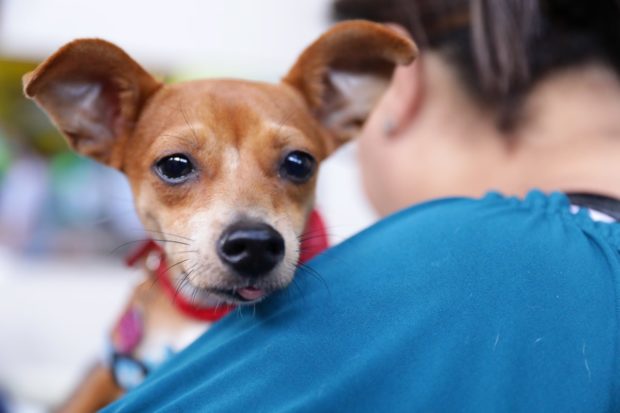
Animal Care Expo 2019 has kicked off in New Orleans and one major focus this year is access to care — improving access to veterinary medical treatment for all animals in need, and providing better support for those who love and care for them. Photo by Shannon Jax Productions
Our Animal Care Expo 2019 in New Orleans has attracted a record 2800 participants from the United States and around the world, with some 226 attendees from 53 different countries in attendance. We’re so proud of what this event has become; the premier educational conference and trade show serving the animal care and services community worldwide. We’re especially grateful to Maddie’s Fund and the Petco Foundation for their generous support this year, which has made it possible to expand our base of individual scholarships.
Our international participation is at an all-time high too, with some 226 attendees from 53 different countries in attendance. Expo’s International track saw the debut of Humane Society International’s state-of-the-art suite of apps, a product of four years of field research. The apps facilitate cloud-based data collection and storage for spay/neuter and rabies vaccination programs, ensuring high-animal welfare and program impact. These apps are now globally available free of cost to the public.
One of the unifying themes of this year’s event involves access to care—improving access to veterinary medical treatment for all animals in need, and providing better support for those who love and care for them. This focus is vital to the future success of companion animal welfare. Ensuring greater and more affordable access to care has emerged as a key component of programs to reduce animal homelessness, improve animal well-being and health, eliminate euthanasia of healthy animals and engage a broader and more diverse public with animal welfare and humane work.
One initiative featured this year is the Access to Veterinary Care Coalition, which is working with the University of Tennessee College of Social Work and the Veterinary Social Work program at the University of Tennessee College of Veterinary Medicine. In late 2018, AVCC released a report, Access to Veterinary Care: Barriers, Current Practice, and Public Policy. A survey of petkeeping nationwide that included populations with poor or inadequate access to veterinary care and to veterinary service providers, the report seeks to lay the foundation for better informed public, corporate, institutional and individual action in this area. Representatives of the initiative spoke at a special daylong Monday session of the Humane Society Veterinary Medical Association and in a plenary talk.
Our own Pets for Life program is at the heart of an advanced study now underway at the University of Denver’s Institute for Human-Animal Connection (IHAC). The project’s researchers have developed a quantitative survey instrument to track the One Health impacts of Pets for Life. One Health encompasses the notion that the health of humans, nonhuman animals and their shared ecosystems are deeply interdependent. For its part, Pets for Life was designed precisely with such sensitivity in mind. It focuses on the removal of barriers to access for companion animal care services (spay/neuter, vaccination, wellness exams or behavioral training, for example) in underserved communities. IHAC has already published one innovative study reviewing and analyzing PFL data around race and ethnicity not being primary determinants in the decision of people to spay/neuter, an important discussion in the effort to make our movement more inclusive.
A second HSUS initiative, Spayathon for Puerto Rico, is also the subject of a research study, this one undertaken by the University of Florida Maddie’s Shelter Medicine Program, which is conducting the largest ever prospective study of MASH style spay neuter/vaccination programs with the goal of demonstrating the efficacy and safety of such programs particularly for underserved populations.
Maddies has supported the AVCC’s work, that of the Shelter Medicine program at the University of Florida School of Veterinary Medicine and Spayathon and, along with the Watershed Animal Foundation, the success of Pets for Life over the years.
The commitment of foundations and other stakeholders to such research is fundamental to establishing a stronger baseline understanding of the scope of animal overpopulation in the United States, and to a deeper integration of humane work with public policy and philanthropic initiatives designed to improve the landscape of animal welfare.
Access to care for animals is truly a front-line focus now, and I’m pleased to report that HSUS personnel are so deeply involved with these and other initiatives that benefit humans and animals alike. Through our Rural Area Veterinary Services and HSVMA clinics in underserved areas, and through the programs described above, we’re taking a big bite out of the challenge of ensuring that all animals in need get the care that they need, that all those who care about animals can gain access to the services and support that they require, and that every community can enjoy the many benefits of an enhanced animal care infrastructure. It’s wonderful to see these and related programs getting their due at Expo this year.
The post HSUS Animal Care Expo puts access to care on the agenda appeared first on A Humane World.
Enviroshop is maintained by dedicated NetSys Interactive Inc. owners & employees who generously contribute their time to maintenance & editing, web design, custom programming, & website hosting for Enviroshop.
